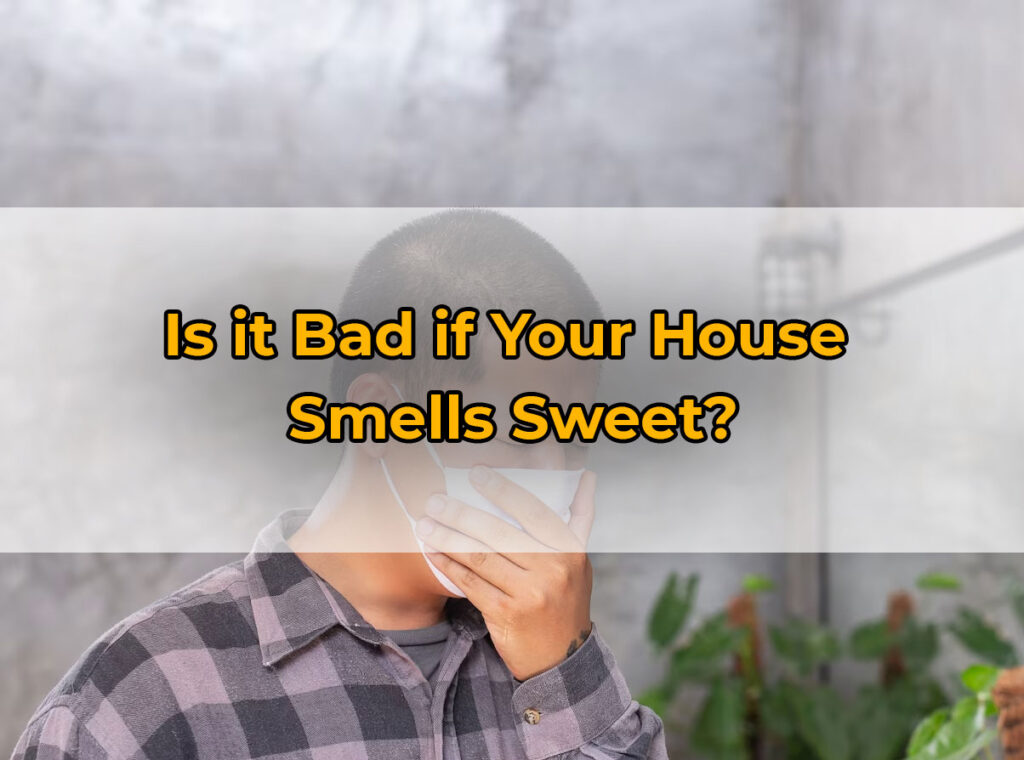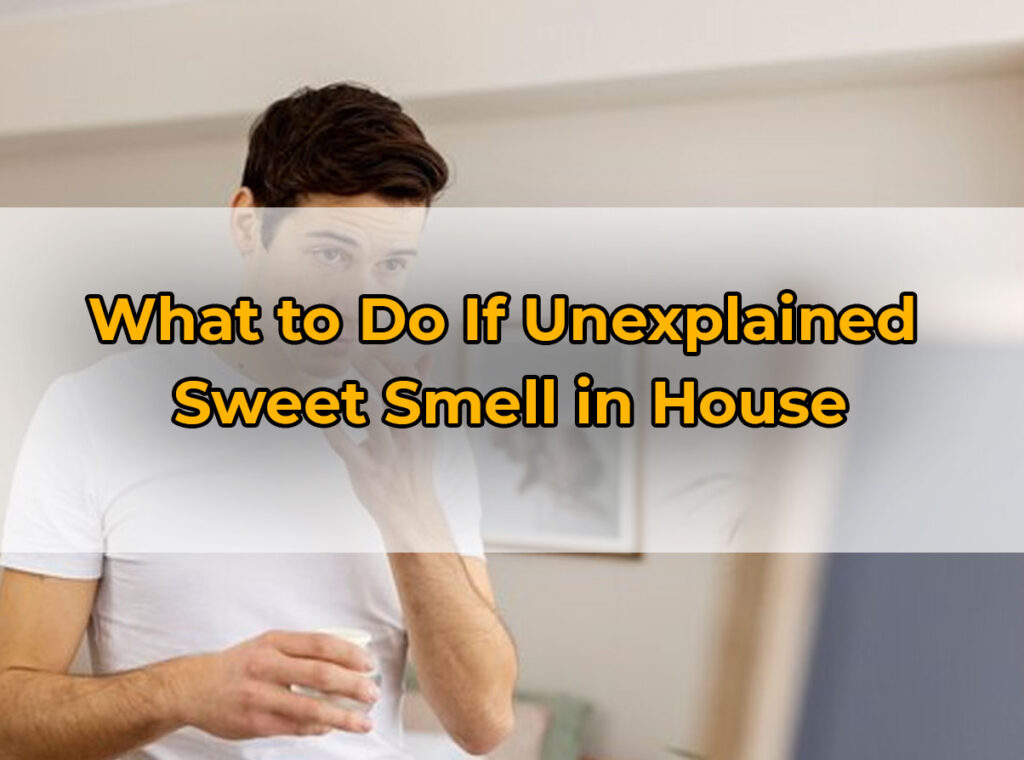The unexplained sweet smell in house can be quite puzzling. You walk into a room and there it is – a tantalizing aroma that you can’t identify. It’s like someone’s baking cookies or brewing coffee, but there’s no source. Don’t worry – you’re not alone!
You might start to wonder if it’s all in your head. Fear not! It’s not figment of your imagination. Many people have experienced this phenomenon and experts believe there are several possible explanations why unexplained sweet smell in house.
Is it Bad if Your House Smells Sweet?

While a sweet scent may seem harmless, it could indicate potential issues that need attention. For instance, an overpowering sugary smell might suggest hidden mold or mildew growth in the walls or ceilings. These hidden sources of moisture can lead to serious health problems for you and your family if left untreated.
Moreover, a persistent unexplained sweet smell in house may point to an infestation of certain pests like ants or rodents. These critters are attracted to sugary substances and can infiltrate homes in search of food sources.
If you notice an unusual sweetness in the air accompanied by signs of pests such as droppings or chewed wires, it’s important to take immediate action before the situation worsens.
Why Is There a Strange Unexplained Sweet Smell in House?

Have you ever been captivated by a mysterious, sweet aroma in your house? It’s an intriguing and perplexing experience. Let’s explore the possible meanings and causes of this unexplained sweet smell in house.
1. Hidden food or organic matter
If your house consistently smells sweet, it could indicate the presence of hidden food or organic matter that is decaying or rotting.
Check areas like the back of cabinets, behind appliances, or even in seldom-used rooms where food might have been left unnoticed. Eliminating the source and maintaining cleanliness should resolve the issue.
2. Electrical or wiring problems
In rare cases, a sweet smell in your house could be associated with electrical or wiring problems. Overheating wires or electrical components can emit a distinct odor.
If you suspect this to be the case, it’s crucial to address the issue promptly to ensure the safety of your home and prevent potential fire hazards. Contact a qualified electrician to inspect your electrical system.
3. Contaminated air conditioning or ventilation system
If the sweet smell seems to be originating from your HVAC system, it’s possible that the air conditioning or ventilation system is contaminated.
Mold or bacteria growth within the ducts or filters can produce a sweet odor when the system is running. In such cases, it’s advisable to have the system professionally cleaned and maintained to improve indoor air quality.
4. Chemical exposure or leaks
Another unique possibility is exposure to chemicals or leaks in your home. Certain chemical substances, such as cleaning agents, solvents, or even gas leaks, can create a sweet smell.
If you suspect chemical exposure or notice any other associated symptoms like dizziness or headaches, evacuate the premises immediately and contact emergency services.
5. Gas leaks
While not necessarily sweet-smelling, certain gas leaks, such as natural gas or propane, can sometimes be mistaken for a sweet odor.
Gas leaks are extremely hazardous and can lead to explosions or asphyxiation. If you suspect a gas leak, leave the premises immediately and contact emergency services.
6. Pest infestation
Have you recently noticed a strange, unexplained sweet smell lingering in your home? If so, you may be dealing with a pest infestation. Pests such as rats, mice, and even ants are known to emit an unusual odor that can be described as sweet or musty. This scent is often the result of their urine, droppings, or secretions left behind as they navigate through your living spaces.
One common culprit for this peculiar smell is rodents. Rats and mice tend to mark their territory by urinating on various surfaces throughout your home.
The urine contains pheromones that serve as a chemical message to other rodents that this space has already been claimed. As the urine dries up over time, it releases an unpleasant yet strangely sweet smell that can become more noticeable when the infestation grows larger.
7. Plumbing issues
One possible cause of the unusual sweetness lingering in your home is a hidden water leak. Leaky pipes or fixtures can create an environment where mold and mildew thrive, emitting a distinct scent that resembles sweetness.
These leaks are often concealed within walls or under flooring, making them difficult to detect without professional assistance.
Steps to Identify The Source of The Sweet Smell
Are you trying to figure out why your unexplained sweet smell in house? Here’s how to uncover the source of that sugary scent and get rid of it for good!
- Start with the kitchen – check for any spills, rotting fruits, or expired items. Clean up messes and throw out any potential causes.
- Look in the bathroom – examine bath products, perfumes, and cleaning supplies. Ventilate and use air fresheners if needed.
- Check garbage bins – especially if they contain fruit peels or spoiled food. Empty them and use scented bags or regular cleanings to stop odors.
- Examine air vents – make sure there’s no dust or debris build-up. Clean or replace air filters regularly to maintain a fresh environment.
- Search for mold or mildew – sweet smells can arise from damp spaces like basements, crawlspaces, or bathrooms. Address any mold issues immediately.
- Explore uncommon areas – closets, storage rooms, and hidden nooks and crannies. Pay attention to any items that may be releasing a fragrance, such as scented candles or potpourri.
And, remember, certain medical conditions can cause people to smell sweet scents, so if you’ve checked all other possibilities, this could be worth considering.
Say goodbye to the sweet smell in your home by getting rid of all the sugary stuff – fresh air is way better!
What to Do If Unexplained Sweet Smell in House

Are you smelling something sweet in your house? Don’t worry! Here are some tips to resolve your home smelling fresh again from unexplained sweet smell in house.
1. Identify the source
Try to pinpoint the location and source of the smell. Carefully inspect different areas of your house, paying attention to hidden or less frequently visited spaces, such as closets, cabinets, basements, and crawl spaces.
Look for any potential causes like food residues, cleaning products, mold growth, or pest activity.
2. Eliminate obvious causes
Start by checking if there are any food items or ingredients that may have spilled or gone bad. Inspect your pantry, refrigerator, and trash cans thoroughly to ensure there are no forgotten fruits, sugary snacks, or decaying leftovers that could be emitting the sweet odor.
Next, examine all areas of your house where cleaning products are stored. Sometimes these products can leak or spill without you even realizing it. Look for any signs of leakage from bottles or containers and clean up any spills promptly. Additionally, consider if any air fresheners or scented candles might be contributing to the scent.
3. Check for potential hazards
While it may seem pleasant at first, this could actually be a sign of potential hazards lurking in your house. It’s important not to ignore these strange odors and take immediate action to ensure the safety of yourself and your family.
One possible cause of an unexplained sweet smell is a gas leak. Natural gas is odorless, but utility companies add a chemical called mercaptan to give it a distinctive scent similar to rotten eggs or sulfur.
However, in some cases, this additive can create a sweet aroma that masks the true danger. If you detect this smell in your house, it’s crucial to act swiftly by leaving the premises immediately and contacting emergency services. Gas leaks can be highly dangerous and even lead to explosions if left unchecked.
4. Improve ventilation
Poor ventilation can lead to a buildup of odors, causing strange and unpleasant scents to permeate your living space. The first step is to check your air filters and ensure they are clean and functioning properly. Clogged or dirty filters can trap odors, leading to the sweet smell that you may be experiencing.
Next, examine the exhaust fans in your kitchen and bathroom. These fans are designed to remove moisture and odors from these areas, but if they are not working efficiently, the smells can linger.
Clean any accumulated debris from the fan blades and ensure that they are fully operational. Additionally, consider investing in air purifiers or dehumidifiers to improve indoor air quality and eliminate any unwanted scents.
5. Monitor the situation
Keep track of whether the smell persists or dissipates over time. If the odor continues or worsens, it may be necessary to seek professional help or guidance.
Consider contacting specialists such as plumbers, electricians, HVAC technicians, or home inspectors who can assess the situation more thoroughly and provide expert advice.
6. Consult professionals if needed
If you can’t find any immediate cause, it’s time to consult professionals who can help.
Contacting a plumber should be your next move if the odor persists but remains untraceable. They have the expertise to detect hidden leaks in your plumbing system that could be causing the sweet smell.
Ignoring such leaks not only risks damage to your property but also poses health hazards due to potential mold growth and compromised air quality.
Potential Health Concerns Associated with the Sweet Smell
The aroma in the house may be concerning for our health. It is necessary to be aware of the risks this unexplained sweet smell in house could bring.
- This scent could be from chemicals or toxins, which could be hazardous to our lungs and overall health if breathed in for too long.
- Sometimes the sweet smell could be from mold or fungus, that could trigger allergies and breathing issues.
- In other cases, it could signal a medical issue, like a fruity odor from ketones in diabetics’ breath.
We need to act fast if there is an unknown sweet smell in the house. Seek professional help if the smell persists or causes unease.
By being aware of the dangers, we can make sure we and those around us stay healthy from unexplained sweet smell in house.
Is there a mold that smells sweet?
This particular type of mold is known as the Sweet Smell Mold, or scientifically referred to as Hypomyces odoratus. While most molds have an unpleasant odor, the Sweet Smell Mold stands out for its unique fragrance.
The Sweet Smell Mold is commonly found growing on decaying organic matter such as wood, leaves, and plant debris. It typically thrives in damp environments with high humidity levels.
When this mold colonizes on its preferred surfaces, it releases volatile organic compounds (VOCs) which produce a distinctively sweet smell. Although the scent may be pleasing to some individuals, it’s important to note that exposure to any type of mold can still present health risks.
Why does my house smell like burnt sugar?
One possible explanation for the burnt sugar smell could be an electrical problem. Overheating electrical wires or faulty appliances can generate a distinct odor similar to burning caramelized sugar.
If you notice this scent, it’s crucial to immediately check all electrical outlets, switches, and appliances for any signs of damage or overheating. It’s recommended to turn off power sources associated with suspicious smells until a professional electrician can inspect and fix any potential issues.
Is sweet smell a chemical substance?
The answer is yes. Sweet smells are indeed the result of various chemical compounds interacting with our senses.
The fragrance of flowers, for example, comes from volatile organic compounds (VOCs) that are released into the air by the plants. These VOCs, such as terpenes and esters, have distinct molecular structures that give rise to their unique scents. Similarly, the sweet smell of fruits also comes from chemicals like aldehydes and ketones present in their ripened flesh.
It is important to note that not all chemicals have a pleasant smell – some can be quite repugnant or even toxic.
“There is no real ending. It’s just the place where you stop the story.”






